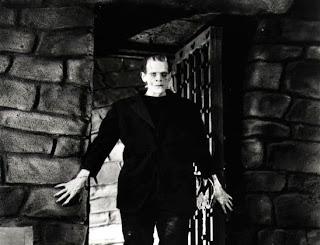 Many Universal horror films haven't aged well, more iconographic than scary. James Whale's Frankenstein (1931) is an exception. Crude around the edges, it nonetheless retains its basic power.
Many Universal horror films haven't aged well, more iconographic than scary. James Whale's Frankenstein (1931) is an exception. Crude around the edges, it nonetheless retains its basic power.Dr. Henry Frankenstein (Colin Clive) lives secluded from society, using cadavers in an experiment to reanimate life. He finally succeeds in creating a living Monster (Boris Karloff) which he struggles to tame. Tormented by Frankenstein's assistant Fritz (Dwight Frye), the Monster escapes and goes on a rampage. Unaware of his creation's doings, Frankenstein arrives in town to marry his old flame Elizabeth (Mae Clarke), but must confront the Monster when he murders a child.
If nothing else, Frankenstein is far more cinematic than its talky, stage bound cousins Dracula and The Mummy. Whale creates expansive, iconic sets, with Frankenstein's cavernous castle, with looming shadows and torch lit passages, setting the monster movie standard. But he also plumps for exteriors and crowd scenes which open up the story. Most effective is the long take when Ludwig (Michael Mark) staggers into town, carrying his daughter's corpse into town. A tracking shot follows him as the villagers follow, a wedding party turning into a lynch mob.
Due to censorship and a compact runtime, Frankenstein can't be as explicit as Mary Shelley's novel in exploring themes of man's hubris in playing God. Writers Francis Edward Faraogh and Garrett Fort try framing Frankenstein as an idealist driven crazy by power, but he shifts abruptly between cackling madman and love struck penitent. Whale grants the Monster personality, but he's given a rude send off. Where Shelley's monster gets a poignant monologue, this one's roasted alive by a mob. Such is the lot of Hollywood monsters.
Most of the cast is mannered in typical Universal style, with Dwight Frye and Frederick Kerr (as Frankenstein's father) the worst offenders. They're overshadowed by Boris Karloff, who finds humanity beneath smothering makeup and a hulking costume. Reducing to monosyllabic grunts, Karloff reaches for small gestures; Frankenstein's awed, frightened reaction to sunlight, his childlike, shuffling walk, a poignant scene where he befriends Maria until he underrates his own strength. It's a mark of Karloff's brilliance that these touches shine through a beastly character.
Frankenstein is a mixed bag, creepy in some regards and creaky in others. James Whale revisited the character four years later with a far more ambitious, nuanced sequel that recaptured the original's squandered potential. But that's another review.

